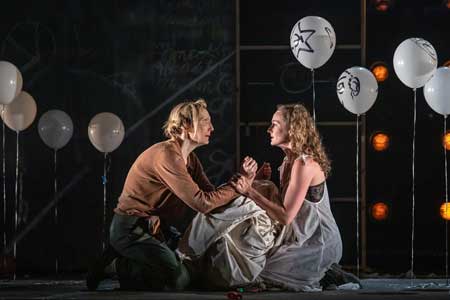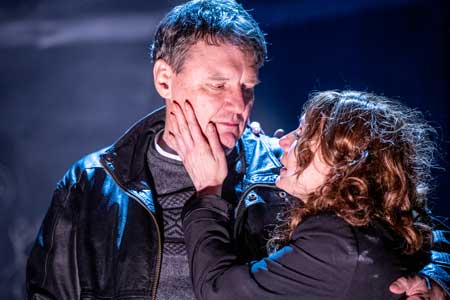Play (2009)
by Tadeusz Słobodzianek
Adaptation by Norman Allen
Directed by Igor Golyak
Arlekin Players Theater
Boston Center for the Arts
South End, Boston
June 13-22, 2025
Scenic Design: Jan Pappelbaum; Lighting Design: Jeff Adelberg; Costume Design: Sasha Ageeva; Sound Design: Ben Williams: Composer: Anna Drubich; Projections Design: Eriс Dunlap; Chalk Drawings Design: Andreea Mincic; Choreographer: Or Schraiber
With Chulpan Khamatova (Rachelka/Marianna), Richard Topol (Abram), Jeremy Beazlie (Heniek), Ryan Czerwonko (Zygmunt), Zach Fike Hodges (Jakub Katz), Deborah Martin (Zocha), Kirill Rubtsov (Rysiek), Ilia Volok (Wladek), Gigi Watson (Dora)

Gigi Watson as Dora
in “Our Class”
Photo: Olga Maturana
Courtesy of Arlekin Players Theater
In Jedwabne, Poland, a group of Jews and non-Jews have grown up and gone to school together. Nonetheless, anti-Semitism is prevalent. With the conquest of Poland by the Nazis in June, 1941, it would appear that any massacres of Jews would have been attributable to the Nazis. Indeed, when, in Jedwabne in July, 1941, an entire community of Jews was locked into a barn which was then set on fire, it was assumed that the Nazis had been responsible. So the explanation went until 2000, when the book Sasiedzi (Neighbors) by Jan Gross gave a full account of what had actually happened, which was that local Poles had committed the atrocity. Our Class details the unfolding of that event, what led up to it, and follows out some of the histories of those affected.
A group of Jewish and Catholic students, all born around 1920, are classmates in Jedwabne in the 1930s and are well acquainted with one another. Abram (Richard Topol), one of the Jews, leaves Jedwabne to go to the United States before the central dramatic events that follow have occurred, but he remains in touch by mail with some of those who remain and serves as a kind of narrator. Of the other Jewish classmates who remain, including Jakub Katz (Zack Fike Hodges), Menachem (Gene Ravvin), Dora (Gigi Watson), and Rachelka (Chilpan Khamatova), several are victims of the massacre, while three of them survive, but do so with considerable compromise. Perpetrating the massacre is a group of male Catholic classmates, including Rysiek (Kirill Rubtsov), Heniek (Jeremy Beazlie) and Vladek (Ilia Volok), prodded on by Zygmunt (Ryan Czerwonko). Standing by, but not at all participating in the horrors, and, in fact, supporting some of the Jewish characters who flee in the wake of the massacre, is the crippled Zocha (Deborah Martin).
After the massacre, the Catholic classmates bury the truth and replace it with the myth that the Nazis committed the atrocity. One of the complicit even winds up marrying one of the Jewish survivors. Another Jewish survivor escapes and becomes an official in the postwar government and returns to investigate those he suspects of complicity in anti-Semitic activities, though not fully uncovering the extent of the horrors. Another of the Catholics, involved in the massacre and associated acts of sexual violence against Jewish women, becomes a priest.

Chulpan Khamatova as Marianna
in “Our Class”
Photo: Olga Maturana
Courtesy of Arlekin Players Theater
This powerfully gripping drama has all of the aspects that the Arlekin Players have come to bring to their quirky, rough-hewn, but powerfully effective productions. There is an almost casual entry into the story as the actors informally wander onto the stage, collect themselves in a series of seats facing the audience, and proceed to enter into the tale. This, as delineated by playwright Tadkusz Słobodzianek, is the runway from which this ultimately intense work takes off, and the contrast of the relaxed classroom that gathers this group of Jews and Catholics in the Poland of the 1920s and 1930s before the drama ensues in 1941 is an astutely crafted introduction that sets the stage for the intense tragedy which follows.
Gradually the horrors develop, and one gets a vivid sense of the distinction between the group of Catholic young men who begin to construct the tragedy that is about to take place and the Jews who live among them.
The set by Jan Pappelbaum is unique and dramatic, making use of a very high background construction on which all sorts of projections by Eriс Dunlap and featuring chalk drawings by Andreea Mincic, take place and within which the evocations of the site of the massacre are created. Other, low-tech but very effective techniques are employed, like the use of inscribed helium balloons which float above and pop in the rafters to represent the murdered Jews.
The actors all come out with numbered shirts, calling to mind both the emblems of sports teams at a school, and, correlatively, the numbers of those committed to concentration camps.
Music by Anna Drubich, sound by Ben Williams, and lighting by Jeff Adelberg are employed very effectively, with any number of interleaved sound slices brought in to call the era to mind, and any number of shadings and more dramatic light alterations to give a sense of the dramatic changes.

Jeremy Beazlie as Heniek
Ryan Czerwonk as Zygmunt
Zach Fike Hodges as Jakub
in “Our Class”
Photo: Olga Maturana
Courtesy of Arlekin Players Theater
The acting is very good all around. Deborah Martin is particularly effective as the sole Catholic woman portrayed, the deeply sympathetic Zocha, and Martin brings her native capacity for powerful and angular portrayals to this role. Throughout she has a notable moral forcefulness; consistent and powerful throughout, the portrayal wavers just a bit at the very end when Zocha enters an old-age facility in the United States and the character becomes a bit caricaturish. But close to that ending, Zocha’s very aware and self-conscious response to being lauded as one of the non-Jewish righteous protectors of the Jews has a strong and vividly persuasive moral ring to it.
As the prime villain Zygmunt, Ryan Czerwonko is creepily potent as a demonic youth, and also does a good job when it comes time for Zygmunt to be called to account. As Heniek, the Catholic perpetrator who becomes a priest, Jeremy Beazlie is perfectly slimy, embodying hypocrisy to a T. As Avram, who climbs high on a ladder to survey the scene from afar, Richard Topol gives a good and warmly solid account, exhibiting urgency from afar. And, as the Menachem, who finds things imposed upon him later on in a way that he cannot quite handle, Gene Ravvin gives a forceful but appropriately broken account, giving a strong sense of what fractures arise from the combination of willpower and trauma. As Rachelka/Marianna, Chilpan Khamatova offers a solid anchor throughout, and as Vladek, who becomes her husband, Ilia Volok provides consistent support in a role that, with Khamatova’s, heartbreakingly straddles the boundaries of two cultures.
As with Arlekin’s excellent production, last year, of The Dybbuk, there is a kind of theatrical magic that occurs here. As with particularly potent poetic and dramatic art, a sense of immersion occurs, in some way at an angle to the telling of the tale. One does not so much witness the telling but one undergoes it, with a sense of its existential embrace. In this sense, The Arlekin Players, here, as in previous endeavors, conjures an environment that envelops and infects, rather than simply depicting. One not only gets caught up in the action and events, but one succumbs to them.
The vividness of that sense, particularly evident in the second act of Our Class, is undeniable and indicates the intensive subliminal powers at work in this production. Indeed rough and unexpected in many ways, the production yields a visceral experience, depicting a horrific historic event, but imprinting, like a tattoo, a reminder of the ways in which deep social betrayal – in local community and among classmates and friends – can be prompted to occur.
Under Igor Golyak’s gifted visionary sense and equally gifted directorial hand, Arlekin has once again created an oddly edgy masterpiece, full of angles and rough faces, all effectively tuned towards a powerful theatrical alchemy.
– BADMan (aka Charles Munitz)
Leave a Reply